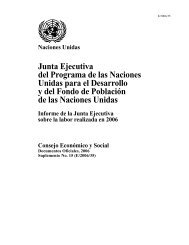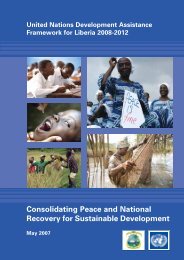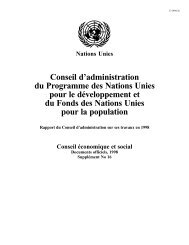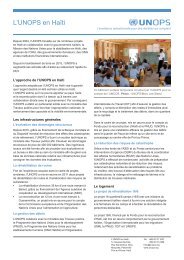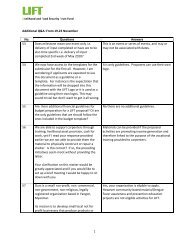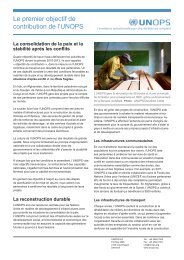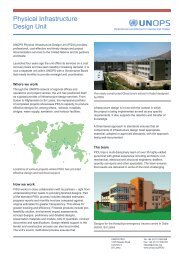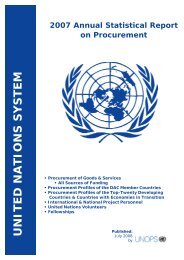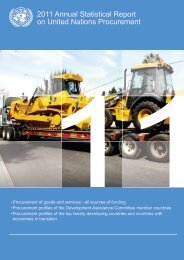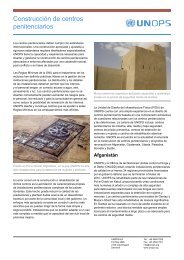India UNDAF 2008-2012 - UNOPS
India UNDAF 2008-2012 - UNOPS
India UNDAF 2008-2012 - UNOPS
You also want an ePaper? Increase the reach of your titles
YUMPU automatically turns print PDFs into web optimized ePapers that Google loves.
<strong>India</strong> <strong>UNDAF</strong> <strong>2008</strong>-<strong>2012</strong><br />
ensuring that all agencies are aware of the advocacy messages, so that they may in<br />
their own turn be advocates and the UN system sends out consistent messages.<br />
Elected Representative Fora<br />
Several agencies have established relationships with elected bodies in order to increase<br />
the members’ understanding of specific development issues, so that legal and<br />
policy frameworks may give due importance to them. In keeping with the recognized<br />
importance of these groups, particularly in <strong>India</strong> where many of the development<br />
issues are state subjects, the United Nations intends to work more closely among themselves,<br />
to develop a cohesive frame for this support, and to clarify what services might<br />
be available from the United Nations to support elected bodies’ role for the achievement<br />
of the MDGs.<br />
Multi-Party Fora on cross-cutting issues<br />
While operating under the overall guidance of the Government of <strong>India</strong> as its primary<br />
partner in the country, the United Nations may opt to support national dialogue on<br />
issues of particular global and national importance within the country. The purpose of<br />
such support would be to provide a collaborative platform for a number of government,<br />
NGO and aid co-operation partners to discuss issues of common concern, and<br />
agree upon common strategies and actions. During the upcoming programme cycle,<br />
water has been identified as an area of common concern. A national chapter of UN<br />
Water will be formed in <strong>India</strong>. Other issues may be identified as the cycle progresses.<br />
Mechanisms for Collaborative Implementation of the<br />
<strong>UNDAF</strong><br />
Systems of collaboration and co-ordination will be essential for the UN system in <strong>India</strong><br />
to achieve the results (at the CP Output and CP Outcome levels) stated in the Results<br />
Matrix. For the achievement of the CP Outputs - for which the UN system is accountable<br />
- the Country Team has identified lead agencies. This lead agency will be responsible<br />
for convening representatives of other agencies working for that result at least<br />
quarterly. During 2007, after approval of the <strong>UNDAF</strong>, the concerned entities will meet<br />
in order to develop a joint work programme for the coming year. This work programme<br />
will enumerate the activities of each entity, with a view to compile a comprehensive<br />
picture of the work of the UN to accomplish that output. During the work planning, it is<br />
expected that the agencies will also be in a position to decide how to collaborate most<br />
effectively during the coming year. In some cases they may decide to jointly implement<br />
activities, possibly knowledge sharing events such as workshops and confer-<br />
34




